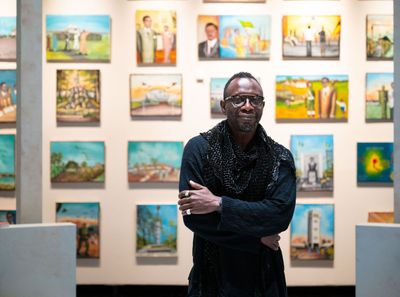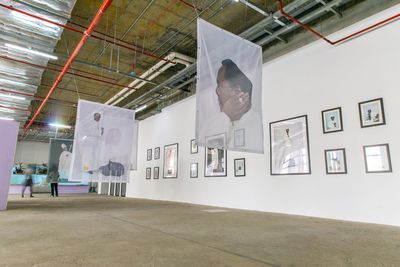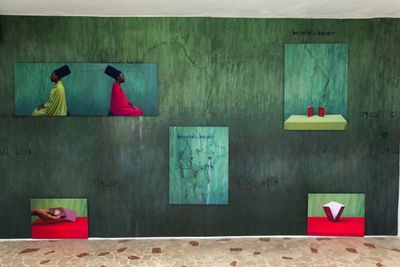
07 Nov LagosPhoto Festival to Open as Biennial in 2025
Source Credit: Content and images from Ocula Magazine. Read the original article - https://ocula.com/magazine/art-news/lagosphoto-festival-to-open-as-biennial-in-2025/
Founding director Azu Nwagbogu told Ocula about this year’s theme, Incarceration, and photography’s power to challenge stereotypical narratives of Africa.

Azu Nwagbogu (2024). Photo: Pardis Faqiri.
LagosPhoto Festival, Nigeria’s annual photography exhibition showcasing work from the African continent and beyond, will open as a biennial in October 2025.
The format change follows the Festival’s expansion to Benin in 2023, which saw 38 local and international artists—including acclaimed image-makers like Zanele Muholi and Georges Adeagbo—exhibit at cultural venues across four cities in Nigeria and Benin.
Founding director Azu Nwagbogu explained that a less frequent event allows for a more considered approach.
In its 15th year, LagosPhoto Festival will address the theme Incarceration, speaking to confinement and liberation. Exhibitors include Beninese photographer Ishola Akpo, Californian artist Adrian L. Burrell, and Ghanaian filmmaker and photographer Carlos Idun-Tawiah.
In the leadup to LagosPhoto Festival 2025, Nwagbogu spoke with Ocula about the festival’s evolution, the importance of this year’s theme, and photography’s strengths as a medium in fostering dialogue and challenging stereotypes.
In 2010, you started LagosPhoto to challenge Afro-pessimism and to generate dialogue between African artists, many of whom felt isolated, as you have told The Guardian. How does photography support these ends?
Photography is a uniquely powerful medium that transcends language and cultural barriers, making it an ideal tool for fostering dialogue and challenging stereotypes. In a world where African narratives have too often been shaped by external perspectives, photography allows African artists to present their own visions and realities.
But as [American writer and civil rights activist] Audre Lorde stated: ‘For the master’s tool will never dismantle the master’s house. They may allow us temporarily to beat him at his own game, but they will never enable us to bring about genuine change.’ For genuine change, we need to interrogate archives and develop new languages and tools.
To what extent has LagosPhoto achieved its intended goals?
Before LagosPhoto, there was no art season in Lagos. Being the catalyst for new energies along with our fashion week and collaboration with other art spaces in the city, we have created and nurtured a community that cares about images, image-makers, and art.
Over the past 14 editions, LagosPhoto has made significant strides toward its founding goals. We have built a community of African and international photographers. By highlighting diverse African perspectives, we’ve seen the festival grow into a platform where artists address both personal stories and global issues, fostering understanding and connection across borders.
Exhibition view: Samuel Fosso, BLACK POPE, LagosPhoto Festival (25 November–15 December 2017). Courtesy LagosPhoto Festival.
The 15th LagosPhoto Festival will open as a biennial next year after cancelling its 2024 edition, which was scheduled to open in October. What happened?
The decision to transition LagosPhoto to a biennial format was made to allow for a deeper, more inclusive experience for both artists and audiences. We felt that the expanded format would provide the necessary time for planning, creating more impactful programming, and supporting a larger, more diverse group of artists.
The festival’s expansion to Benin in 2023 affirmed the importance of this evolution. Moving to a biennial will allow us to reflect on past editions while enhancing the festival’s scope and depth, giving us the capacity to foster more profound dialogues around the themes we explore.
What does this year’s theme, Incarceration, mean to you?
Incarceration goes beyond physical imprisonment to include intellectual, psychological, and societal forms of captivity. The theme challenges artists to address not only visible forms of confinement but also the invisible forces limiting freedom—be it through outdated narratives, borders, or even the digital panopticon of social media.
We hope that the exhibitions and commissions we support illuminate these subtle yet pervasive forms of incarceration and invite viewers to question their own perceptions.
Ultimately, we want to speak about freedom—to spark discussions that move toward liberation, helping viewers understand the myriad ways people can be, and seek to break free from these confinements. But the word freedom is closely associated with pro-fascist ideology and nationalism, which is anathema to my religion.
Exhibition view: Maïmouna Guerresi, BEYOND THE BORDER, LagosPhoto Festival (27 October–15 November 2019). Courtesy LagosPhoto Festival.
Apart from expanding to Benin, how has LagosPhoto evolved since its inception?
LagosPhoto has grown significantly in scope and ambition. The expansion has opened new conversations and perspectives, engaging audiences beyond Nigeria. Over the years, LagosPhoto has also become a platform for addressing broader global issues, from social justice and decolonisation to ecological and technological concerns.
Additionally, LagosPhoto has strengthened partnerships with international organisations like Magnum Photos and the Women’s International League for Peace and Freedom, fostering collaborations that allow for a richer diversity of voices.
Looking forward, we envision LagosPhoto as a biennial that amplifies these efforts, continuing to challenge conventions and support new, evolving modes of visual thinking. —[O]
Source Credit: Content and images from Ocula Magazine. Read the original article - https://ocula.com/magazine/art-news/lagosphoto-festival-to-open-as-biennial-in-2025/



